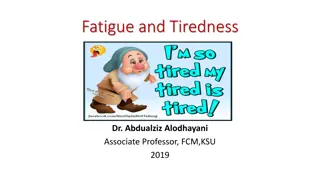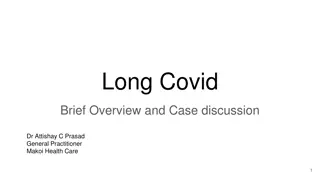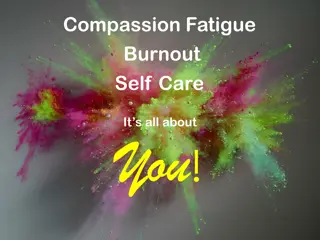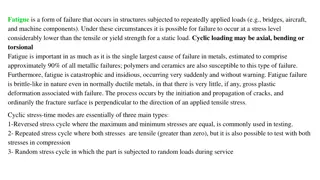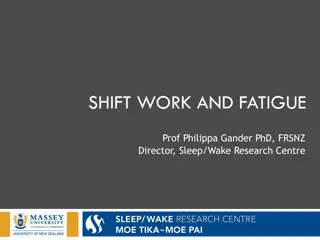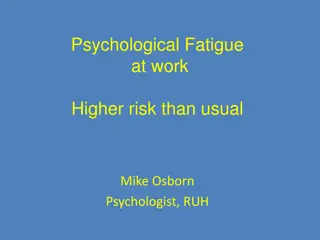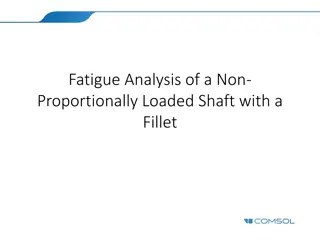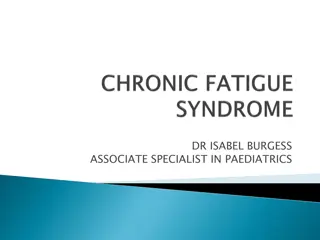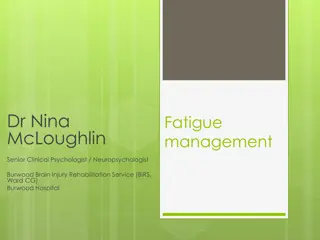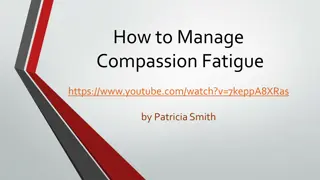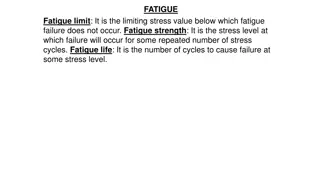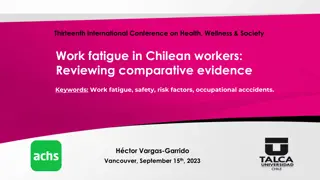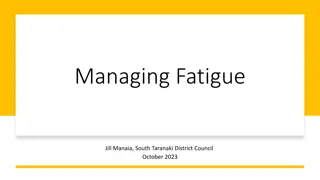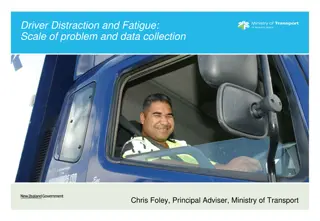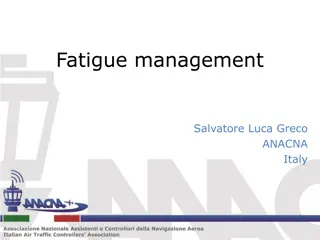Understanding Fatigue: Causes, Symptoms, and Management
Fatigue is a distressing condition affecting physical, emotional, and cognitive aspects, often not alleviated by rest. It can be a common symptom after brain injury, spinal cord injury, and visual impairment. Symptoms include flu-like symptoms, sleep disturbances, cognitive difficulties, and emotional effects. Various factors can fuel fatigue, such as physical activity, thoughts/emotions, pain, medication, and stress. Understanding different types of energy and managing a boom/bust cycle are essential in addressing fatigue. Occupational therapists play a crucial role in educating and supporting individuals dealing with fatigue.
Download Presentation

Please find below an Image/Link to download the presentation.
The content on the website is provided AS IS for your information and personal use only. It may not be sold, licensed, or shared on other websites without obtaining consent from the author. Download presentation by click this link. If you encounter any issues during the download, it is possible that the publisher has removed the file from their server.
E N D
Presentation Transcript
Joanne McLoughlin Independent Occupational Therapist Sarah Butterworth Case Manager / Occupational Therapist FATIGUE AND ENERGY FINDING THE BALANCE
What is Fatigue? A distressing, persistent subjective sense of physical, emotional and /or cognitive tiredness or exhaustion that is not proportional to recent activity and interferes with usual functioning. ( National Comprehensive Cancer Network, 2014). Fatigue can be described as the lack of energy and motivation (both physical and mental). This is different than drowsiness, a term that describes the need to sleep. Not alieviated by rest. Fatigue is common symptom experienced by people who have a visual impairment ( Leissner et al.,2014). Fatigue is reported to be one of most common symptoms following brain injury (Malley et al, 2014). Fatigue is experienced by 25% of patients following Spinal Cord Injury. (Anton et al, 2008). Post traumatic brain injury fatigue has significant impact on well-being and quality of life. (Cantor et al, 2008)
Why fatigue is common after Brain Injury. The brain makes over 1,000,000,000,000,000,000 calculations per second. It s okay to rest it for a moment
Symptoms of Fatigue Flu like symptoms Muscle/joint pain Headaches Breathless after a small task Dizziness Nausea Palpitations IBS symptoms Sensory sensitisation. Physical, mental & emotional affects Sleep disturbances Cognitive difficulties poor memory, concentration, word finding, poor attention. Feeling anxious/ depressed Decreased motivation Difficulty making decisions Negative thought patterns
What can fuel fatigue Physical Activity Thoughts / Emotion Cognitive processes Fatigue Pain Loss Medication/ Treatment Sleep disturbance Stress
ENERGY Emotional Energy Worrying Crying Laughing Shouting Arguing Sulking Talking Anger Fear Distress Guilt Anticipation Phone Conversation Homeostatic Energy Digestion Body Temperature Blood sugar levels Water balance of blood Spiritual Energy Beliefs Losses Cognitive Energy Reading Writing Calculations Thinking Watching T.V. Phone conversation College work Art & Craft work Talking Driving Physical Energy Walking Running Sport Sitting Housework Talking Driving Phone Conversation
Boom/Bust Negative Cycle? Over doing it Boom/ Bust Recovery Exhaustion Rest
How do OTs treat Fatigue? Education Activity Diary Pacing/ Routine setting Stopping and prevention of Boom Bust Pattern Purposeful rest- relaxation, mindfulness, Breathe Healthy lifestyle Sleep hygiene Noticing negative thoughts Noticing triggers/ early symptoms Goal Setting Healthy Lifestyle
Brain injury from being knocked over Single Mum with 3 school aged children Worked school hours as a carer Kerry Sleeping during the day & unable to sleep at night Unable to tolerate noise Poor concentration Afraid to go out alone Low in mood- doesn t feel like me anymore
Kerrys Activity Diary Boom Bust Pattern Pacing example Activity Level 08.00 Shower & Dress Sort Kids for school Wash up, put washing on, Clean the bathroom. Hoover 4 rooms Shower & Dress 10 minute relaxation Make & eat breakfast High 10.00 Medium 11.00 Write shopping list/ meal plan Hoover 2 rooms 10 minute relaxation Make & eat lunch Low 12.00 Go Shopping Relaxation 13.00 Intend to eat lunch but collapse with a cup of tea on sofa Fall asleep on sofa 10 minute relaxation Prepare part of evening meal Hoover 2 rooms 20 minute relaxation Makes cup of tea ready for children coming home 14.00 15.30 Woken by children, unable to cope with noise levels
What did we do? Activity diary. Kerry scored her fatigue out of 10. Found pattern that her fatigue would catch up with her on the second day. This showed her that her energy stores were not replenished from a nights sleep as before her ABI. Reviewed activities which were difficult and adapted them to become more manageable Quiet day / Busy day Meal planners and shopping list Sleep hygiene Relaxation Regular meals Brain injury awareness to family and carer Carers and children to recognise when Kerry is tired Turn off TV and radio when doing quiet work or during conversations Delegated heavy jobs in the house Accept she cannot do everything Use of calendar on her mobile phone Always asked for morning appointments Gave herself a reward of a sunbed on a Friday if she felt on track!
No longer has therapy input Continues to plan her meals Sticks to her shopping list- AND writes down ideas for next weeks meals as she is in the supermarket No more daytime sleeps- will have 10 minutes relaxation on the sofa, but no going back to bed. Rests at 2:45 them she knows the kids will wake her up when they come home from school. Altered activities- cleans the shower while she is in it! Where is she at now?
How did you do? The experience of fatigue is very similar across people with different pathologies/ diagnoses. Fatigue is a sign of laziness. Physical activity should be avoided if you have fatigue. Some medications can make fatigue worse. Fatigue can affect memory and concentration. Fatigue is always the result of physical exertion. Fatigue is tiredness. You should push yourself to the limit when energy levels are highest. Stress can make fatigue worse. Doing quizzes like this can make fatigue worse?!
Contact Joanne McLoughlin Sarah Butterworth www.unityot.co.uk www.otsolutions111.co.uk sarah@unityot.co.uk otsolutions111@outlook.com 07392844028 07783019191
References What explains health in persons with visual impairment? Juliane Leissner,1Michaela Coenen,1,2Stephan Froehlich,3Danny Loyola,1and Alarcos Cieza, Health Qual Life Outcomes. 2014; 12: 65. Published online 2014 May 3. doi: 10.1186/1477-7525-12-65 Fatigue after Acquired Brain Injury: a model to guide clinical management Malley D, Wheatcroft J, Gracey F, Posted in Rehabilitation Articles on 19th Jun 2014; V14(2) 17-19. Measuring Fatigue in Persons With Spinal Cord Injury Hubert A. Anton, MD, FRCPC, William C. Miller, PhD, OT, Andrea F. Townson, Arch Phys Med Rehabil Vol 89, March 2008 Fatigue After Traumatic Brain Injury and Its Impact on Participation and Quality of Life Cantor, Joshua B. PhD; Ashman, Teresa PhD; Gordon, Wayne PhD; Ginsberg, Annika BA; Engmann, Clara BA; Egan, Matthew BS; Spielman, Lisa PhD; Dijkers, Marcel PhD; Flanagan, Steve MD Journal of Head Trauma Rehabilitation: January-February 2008 - Volume 23 - Issue 1 - p 41 51 doi: 10.1097/01.HTR.0000308720.70288.af Making a Cup of Tea as an Honours Degree Subject Jennifer Creek First Published March 1, 1996 Research Articlehttps://doi.org/10.1177/030802269605900310



